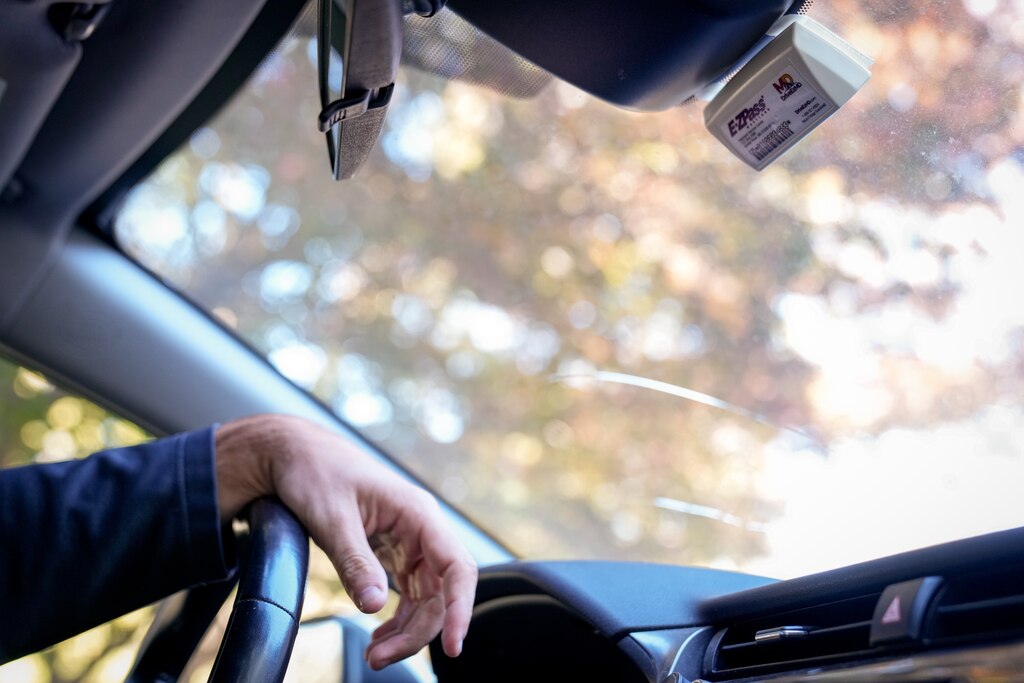Brett Wilson’s small, plastic E-ZPass transponder once helped him shave time off of his daily commute from Bel Air to Baltimore. But over the course of several years, it also became, without him noticing, a ticket to debilitating debt.
His 2019 Toyota Camry, with about 98,000 miles on the odometer and payments still outstanding, has sat parked outside his home ever since a sheriff’s deputy pulled him over earlier this year. The vehicle registration had been suspended. The Harford County resident owes tens of thousands of dollars to the state of Maryland before he can drive it again.
Despite hours on the phone every week with state officials and even searching for legal assistance, he still doesn’t fully understand how the fines and fees ballooned to around $30,000. He says that the 20% down payment alone that he is being pushed to make is well over the original toll charges.
The state’s toll facilities, which are owned and operated by the Maryland Transportation Authority (MDTA), fund and maintain critical transportation infrastructure, including the Bay Bridge and the Interstate 895 and 95 tunnels. An E-ZPass allows drivers to navigate them — and toll facilities in more than a dozen other states — without physically stopping to pay a toll.
But the stories of Wilson and others who spoke with The Baltimore Banner show that when billing issues crop up, customers have few, if any, avenues to turn to for help. There’s little indication that Wilson’s experience is widespread, and the MDTA says it offers multiple ways for those with fines to repay. But advocates say that not all options are available to everyone.
Wilson’s saga of trying to understand the charges, work out a payment plan and get help to navigate it all has dragged on for years and taken its own toll on him, strained relationships with family and even eaten away at time he could dedicate to schoolwork.
“You just want to have some kind of relief in some way that’s fair,” said Wilson, who is attending the University of Baltimore. “You know, I’m not looking to not pay. That’s not what I’m trying to do. I’m just trying to pay what I owe without a behemoth amount of money that’s kind of ballooned over my head.”

Toll roads
Wilson’s woes started after he took a job as a truck driver in 2020. He’d commute from Bel Air to an industrial area southwest of Baltimore most days to get to work, using one of the — at the time — three toll facilities to cross the Patapsco River.
Sometime in 2021, he said, a “phone book’s worth” of toll charges showed up at his door, totaling somewhere between $3,000 or $4,000. He was shocked because, aside from a brief span in 2020, his online E-ZPass account had showed he was in the green, he said; he had his bank account connected to it for automatic withdrawals.
“I see debits and credits coming from my account, but to where this, you know, fee is coming from, or why I’m late on certain things, I’m not understanding,” Wilson said.
At the start of the pandemic, Maryland moved to all-cashless tolling overnight, and paused toll collections until October 2020 for vehicles driving without an E-ZPass. But they never intended to forgive the tolls, just delay their collection.
When it came time to collect, the agency’s call center fell into chaos, receiving thousands more calls a day than usual. They were still posting backlogged toll charges to customers’ accounts in the summer of 2022.
That may have been why he found little assistance when he called to understand where his thousands of dollars in charges were coming from. He was seeing reports online of other E-ZPass users claiming incorrect charges, he said. He was busy worrying about his job and stopped getting any notices saying he was overdue on payments, he said.
When a Harford County deputy sheriff pulled him over two years later, he found out that he was in deeper debt than he thought.
A “consumer fact sheet” that he received from an E-ZPass representative and that he shared with The Baltimore Banner shows an original balance totaling nearly $30,000 that has never been explained to him, he said.
The MDTA does not issue such documents, according to an agency representative. The agency offered a general response to questions from The Banner.
“At the MDTA, we are committed to offering the tools and resources necessary for our customers to keep their accounts in good standing,” an agency representative said in an email. To avoid large toll debts, the representative suggested customers pay early, contact the call center or visit a customer service center to resolve issues, as well as maintain a positive account balance. They also suggested downloading the E-ZPass mobile app.
Wilson had tried all of those things, he said. His issues now rest with the Maryland Central Collection Unit, the state’s debt collecting agency.
If a toll is not paid within 30 days of a “Notice of Toll Due,” a $25 civil penalty per transaction gets tacked on, according to the MDTA. The CCU typically steps in after 90 days and adds an additional collection fee.
Raquel Coombs, chief of staff at the Maryland Department of Budget and Management, said in an email that CCU attempts to work with all individuals to develop voluntary payment plans. There are multiple ways that someone who owes a debt can reach CCU, which are outlined on its website, she said.
A collection fee of 17% is assessed to all debts for recovery, Coombs wrote — the percentage does not vary based on the type or amount of debt.
Not everyone can get a payment plan, said Marceline White of Economic Action MD. The CCU also has powers that other debt collectors don’t have, like the ability to use government databases for accessing residents’ contact information and seizing their state tax refund as debt repayment. It happened to Wilson.
“It’s not consistent or clear, it’s really capricious whether you get a payment plan, which is problematic from a justice perspective and an equity perspective,” said White. People struggling to make ends meet get saddled with rising debt, she said, because payment plans don’t factor in other debts and living expenses.
Wilson hasn’t found any flexibility. “They say this is the rate that you’re going to pay. It’s going to be this much over this amount of time. And, ‘Thank you, have a very nice day,’” he said.
Something similar happened to Monique Washington of Baltimore County, who’s also been left making car payments on a vehicle with a suspended registration. Her car insurance payments recently went up, she said, even though it’s just sitting outside her home.
“This is the reason people are getting out-of-state tags because of the way Maryland moves and operates,” Washington said.
She recently got the car — and the thousands in E-ZPass debt that came with it — in a divorce settlement with her ex-husband, whom she says had racked up the fines and fees. She said that the MDTA and Motor Vehicle Administration, which does not handle E-ZPass issues but can prevent someone from renewing their registration until an account flag is lifted, haven’t been willing to work with her on payment plans. They keep asking for her ex-husband to be there, even when she shows them the divorce paperwork.
“I’m missing doctor’s appointments, I’m missing picking up medications, I can’t get them because I can’t get to them,” she said. “My insurance doesn’t cover transportation, so what am I supposed to do?”
Where to turn?
Wilson wonders if many others have had similar experiences. But it’s hard to know if they have, at least in real-time. Reddit threads abound — a $700 charge here, problems after taking a transponder into a rental car there — but there’s little official record.
The consumer protections division of the state attorney general’s office says it has received 121 complaints against E-ZPass from customers in the past six years.
They may not be the best barometer, though. The division refers such complaints to the governor’s office, but ultimately cannot assist consumers because the MDTA is a state agency. The attorney general’s office isn’t an MDTA watchdog — they’re more like their attorneys.
Maryland’s Office of Legislative Audits (OLA) operates a hotline to report fraud, waste and abuse within state government. When contacted and asked about calls regarding E-ZPass, an official cited the hotline as confidential and declined to reveal the nature of any calls.
The OLA has found problems with the MDTA’s operation of E-ZPass before. An audit conducted between 2016 and 2020, which the MDTA disputed in part, cited calls into its hotline alleging the agency had overcharged drivers at certain toll facilities.
An audit for 2021-22, also stemming from allegations made on the hotline, found that more than 80,000 E-ZPass customers were potentially overcharged at a northeast Maryland toll facility. Some of those charges were dismissed through customer disputes, but many were not, the audit found. The next fiscal compliance audit was scheduled to begin this year.
No such governmental body exists to help mediate these kinds of issues, White said.
“There are few measures within Maryland to provide methods for an individual to repay a debt in an affordable, sustainable manner that doesn’t exacerbate an already fragile financial situation,” reads a 2018 report by her organization, known at the time as the Maryland Consumer Rights Coalition.
For Wilson and Washington, they’ve resorted to enlisting the help of local lawmakers — Washington even wrote a letter to Gov. Wes Moore — to ask if they can somehow intervene.
Wilson has tried unsuccessfully to get a state administrative hearing. He’s also asked for help from nonprofit legal organizations, but they have just referred him to attorneys he would have had to pay for.
If he had the extra money for an attorney, he said, he’d rather just put it toward paying off the debt so he can drive his Camry again.
The story was updated to correct the name of the law enforcement agency that pulled Wilson over.





Comments
Welcome to The Banner's subscriber-only commenting community. Please review our community guidelines.